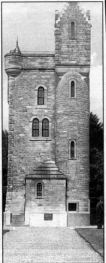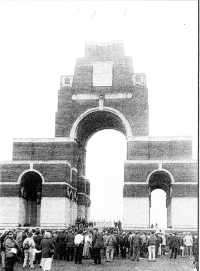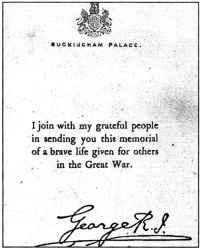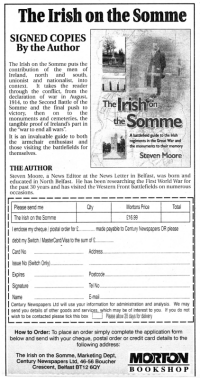Heartbreak of the Somme in Lisburn recalled
 |
|
The Ulster Tower. US26-707SP |
THE heartbreaking voids left in many homes
throughout Lisburn by the Battle of the Somme are recalled in a
new book published to coincide with the 90th anniversary of what
is now regarded as one of the bloodiest events in military
history.
In Lisburn, as in cities and towns throughout
Ireland, parents who watched more than one son march off to war
received the dreaded telegrams telling them not all their
offspring would be returning.
Such a couple were Thomas and Maggie Abbott
of McKeown Street.
Their three sons enlisted in the 11th Royal
Irish Rifles on the outbreak of war.
William, the youngest of the trio, was later
transferred to the 108th Company Machine Gun Corps and it was
while fighting with them that he was killed on July 1, 1916.
His remains were never identified and his
name is among those inscribed on the 'Thiepval Memorial to the
Missing' which overlooks the spot where he died.
William was among the countless thousands
from Ireland, both Unionist and Nationalist who fought and died
on the Western Front.
Many people with Lisburn connections are
recorded on the Thiepval Memorial, such as James Downing, a
lieutenant in the Third Royal Irish Regiment.
The 32-year-old, who had been working in the
Dublin office of the Belfast-based firm of Robert Watson and Co,
was the fifth son of John Downing of Hill Hall.
 |
 |
|
The Thiepval
Memorial to the Missing. US26-706SP |
The King's certificate. US26-708SP |
Captain Henry Parker Beggs had played cricket
for Lisburn and was prominent at athletics events in the town.
The 26-year-old, who lived at Dunmurry and
also played for Cliftonville cricket and hockey teams, was
serving with the Eighth Royal Irish Rifles when killed.
Private William Cunningham's connection with
Lisburn was a little different - he served in the town as a
member of the Royal Irish Constabulary.
Originally from Co Donegal, the 24-year-old
Irish Guardsman was killed on September 12, 1916.
Captain Alexander Allen Wright was educated at
the Ulster Provincial School in Lisburn.
A member of Collegians rugby club, he had worked
for the Audit Office at Belfast City Hall before the war.
He was killed on August 6, 1916, while
serving with the First/Fourth The King's Own (Royal Lancaster
Regiment).
The 36th (Ulster) Division had its
headquarters and divisional medical facilities in the village of
Forceville during much of its preparation for the Battle of the
Somme and many of those buried in the cemetery there are from
the province.
They include Rifleman John Clay, who was just
18-years-old when killed on March 28, 1916.
From Lambeg, his loss must have been felt
greatly by his comrades for they erected a wood cross which bore
the words:
Soldier, rest, thy warfare o'er,
Sleep the sleep that knows no breaking;
Dream of fighting field no more,
Day of toil and night of waiting.
� 'The Irish on the Somme', by Steven Moore,
is available from the Star offices as well as high street
bookshops.

Please click on advert to enlarge